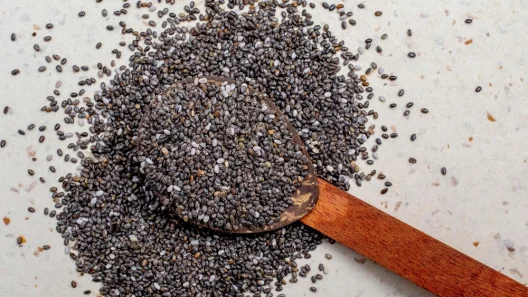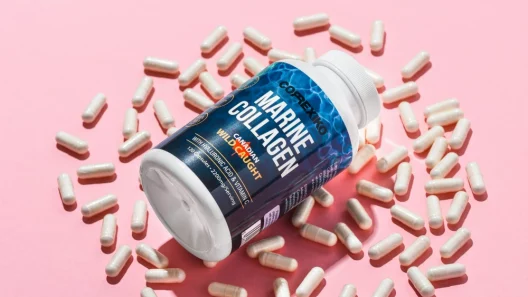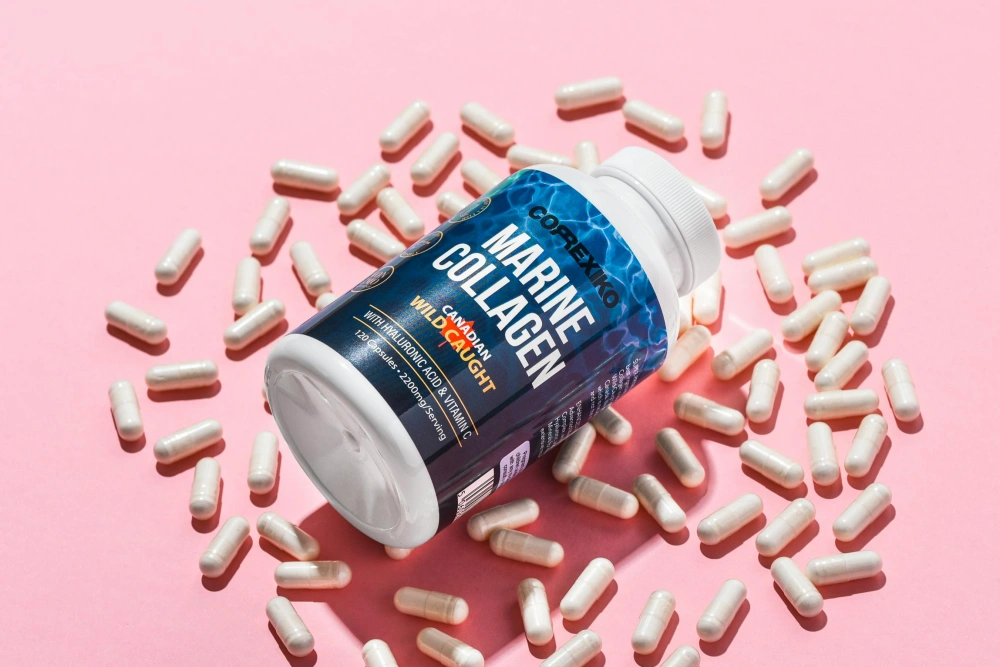The most abundant protein in your body deserves a strategic approach. Here’s how to navigate the world of collagen supplementation.
In the ever-evolving landscape of health and wellness, few supplements have gained as much prominence as collagen. Once a niche beauty secret, collagen supplements are now a booming industry, trending on social media platforms and filling the shelves of health food stores. But what is the science behind the hype? This essential protein, which serves as the fundamental scaffolding for your skin, bones, tendons, and ligaments, naturally declines with age, leading many to seek ways to replenish it.
This comprehensive guide will cut through the marketing claims and provide a research-backed overview of collagen supplements. We will explore what collagen is and why it’s crucial for your body, detail the potential benefits supported by clinical studies, break down the different types of supplements available, and offer practical advice on how to choose a high-quality product. Finally, we will discuss safety considerations and natural ways to support your body’s own collagen production for a holistic approach to health.
What Is Collagen and Why Is It Important?
The Body’s Structural Protein
Collagen is the most abundant protein in the human body, constituting about 30% of your body’s total protein content. Think of it as the “glue” that holds the body together. The word itself is derived from the Greek word “kólla,” meaning glue. It is the primary component of the extracellular matrix, the non-cellular network that provides structural and biochemical support to surrounding cells. This protein is concentrated in your skin, ligaments, tendons, bones, blood vessels, and internal organs, where it provides essential elasticity and strength.
The Decline of Natural Production
As you age, your body’s natural ability to produce collagen declines. This reduction begins as early as your 20s and accelerates over time. This decline is driven by a decrease in the enzymes involved in collagen processing and a reduction in the number of fibroblasts, the cells responsible for its synthesis. This natural slowdown is further exacerbated by external factors like excessive sun exposure, smoking, a diet high in sugar, and environmental pollutants. The gradual loss of collagen manifests in common signs of aging, such as wrinkles, weaker joints, and decreased skin elasticity.
Key Functions in the Body
- Skin Health: Collagen is the main structural protein in your skin, accounting for 80% of its dry weight. It creates a firm, plump foundation, and its decline directly leads to thinning skin and wrinkle formation.
- Joint and Bone Support: In joints, collagen is a major component of cartilage, the tissue that cushions your bones. In bones, it forms the organic framework that provides flexibility and strength.
- Muscle and Tendon Structure: Collagen provides the structure for muscles, tendons, and ligaments, connecting muscle to bone and ensuring mechanical stability.
Benefits of Collagen Supplements
The theory behind supplementation is that providing the body with collagen peptides – small, broken-down units of collagen, can support the body’s natural stores and promote the health of collagen-dependent tissues. Research has begun to explore this with promising, though still evolving, results.
Collagen for Skin Health
This is the most researched area of collagen supplementation. A 2023 systematic review and meta-analysis of 26 randomized controlled trials concluded that hydrolyzed collagen (HC) supplementation significantly improved both skin hydration and elasticity compared to a placebo. The research suggests that these bioactive peptides can stimulate your skin’s fibroblasts to produce more collagen, elastin, and hyaluronic acid, leading to measurable improvements.
- Evidence for Anti-Aging: Studies have shown reductions in wrinkle depth and improved skin elasticity after 8-12 weeks of consistent supplementation.
- Evidence for Hydration: Multiple trials using a tool called a corneometer have demonstrated increased skin hydration levels in participants taking hydrolyzed collagen.
Collagen for Joint & Bone Health
Collagen plays a critical role in maintaining the integrity of cartilage and bone. Supplementation is increasingly investigated for orthopedic health. A 2023 review noted that collagen supplementation can increase bone strength, density, and mass while improving joint mobility and functionality and reducing pain associated with conditions like osteoarthritis. These benefits are thought to occur because the supplied peptides help stimulate the regeneration of cartilage tissue and reduce inflammation in the joints.
Collagen for Muscle Mass & Recovery
For athletes and active individuals, collagen is gaining attention for its potential role in muscle repair and recovery. Collagen provides the amino acids necessary for building muscle tissue. Some research indicates that taking collagen peptides before exercise may boost the body’s production of new collagen in tendons, potentially strengthening them and reducing the risk of injury. This can be particularly relevant for supporting lean body mass as we age.
Other Emerging Benefits
While research is more preliminary, scientists are exploring collagen’s potential for other areas of health:
- Gut Health: Some practitioners suggest collagen may help support the gut lining, though robust human trials are needed.
- Hair and Nails: Anecdotal reports and some small studies suggest collagen can improve nail strength and hair thickness, likely due to its high protein content and role in keratin production.
Table: Summary of Key Evidence-Based Benefits
| Health Area | Reported Benefit | Strength of Evidence | Typical Study Duration |
| Skin Health | Improved hydration, elasticity, reduced wrinkles | Strong (multiple RCTs & meta-analyses) | 8-24 weeks |
| Joint Health | Reduced pain, improved mobility in osteoarthritis | Moderate (review studies show promise) | 4-24 weeks |
| Bone Health | Increased bone density and strength | Emerging (primarily from animal and in-vitro studies) | 6-12 months |
| Muscle & Tendon | Supported recovery and collagen synthesis after exercise | Promising but limited (small-scale human trials) | 1-3 months |
Types of Collagen Supplements
Not all collagen supplements are created equal. They come in various forms and from different sources, each with distinct characteristics.
Collagen Peptides (Hydrolyzed Collagen)
This is the most common and popular form. Hydrolyzed collagen has been broken down into short chains of amino acids (peptides) through a process called hydrolysis. This makes it much easier for the body to absorb from the digestive tract. These peptides are typically flavorless and dissolve easily in both hot and cold liquids, making them incredibly versatile for adding to coffee, smoothies, or soups.
Gelatin
Gelatin is collagen that has been cooked but not fully broken down into small peptides. It is the form of collagen that gives bone broth its gelatinous texture. While it provides the same amino acids, gelatin only thickens in cold water and dissolves in hot water, making it less convenient than peptides for daily use. It’s best used for making gummies, puddings, and sauces.
Marine Collagen
Sourced from the skin and scales of fish, marine collagen is primarily Type I collagen. It is often noted for its high bioavailability due to its smaller particle size and is a popular sustainable alternative for those avoiding bovine or porcine products. Its lower thermal stability can be a limitation for some applications, but it remains a highly effective source for skin health.
Bovine vs. Chicken Collagen
The source of the collagen determines its primary type and thus its targeted benefits :
- Bovine (Cow) Collagen: This is typically rich in Type I and Type III collagen, making it beneficial for skin, hair, nails, and bone health.
- Chicken Collagen: The most abundant source of Type II collagen, which is the main component of cartilage. Supplements derived from chicken sternum cartilage are often marketed for joint health.
How to Choose the Right Collagen Supplement
Navigating the supplement aisle can be overwhelming. Here are key factors to consider to ensure you select a high-quality product.
What to Look for on the Label
- Type of Collagen: Look for “hydrolyzed collagen” or “collagen peptides” for the best absorption.
- Source: Choose a source that aligns with your goals (bovine for skin, marine for sustainability, chicken for joints) and dietary restrictions.
- Dosage: Most clinical studies use doses between 2.5 grams to 15 grams per day. A general effective range is 5-10 grams per serving. Start with a lower dose to assess tolerance.
- Additional Ingredients: Some products are “stacked” with Vitamin C, which is a crucial cofactor for collagen synthesis in the body. Other common additions include biotin and hyaluronic acid.
Third-Party Testing and Certifications
The supplement industry is not as strictly regulated as pharmaceuticals. To ensure purity and potency, look for products that have been verified by independent third-party organizations like NSF International, USP (United States Pharmacopeia), or Consumer Lab. These certifications help confirm that the product contains what the label claims and is free from harmful contaminants. For more on this, see our guide, Choosing Safe and Effective Supplements: What to Look For.
Best Practices for Use
- Consistency is Key: Benefits for skin and joints are not immediate. Research suggests taking collagen consistently for at least 2-3 months to see noticeable results.
- Timing: Some studies suggest taking collagen 30-60 minutes before exercise may enhance its incorporation into tendons and ligaments.
- Pair with Vitamin C: Taking your collagen with a source of vitamin C (like a glass of orange juice or a supplement) can help your body utilize the collagen peptides more effectively.
Safety, Side Effects, and Considerations
For most healthy individuals, collagen supplements are considered safe with a low risk of side effects.
- General Safety: Collagen supplementation is “generally safe with no reported adverse events” in most studies. Some people might experience mild digestive discomfort when first starting.
- Who Should Be Cautious: Individuals with kidney or liver conditions that affect protein metabolism should consult a doctor before taking high-dose protein supplements. Those with severe allergies to the source material (e.g., fish, beef) should obviously avoid collagen derived from those animals.
- Medication Interactions: While direct interactions are rare, it’s always wise to discuss any new supplement with your healthcare provider, especially if you are on medication.
- Industry Bias: A key consideration is that many studies on collagen are funded by supplement companies, which can introduce bias. This underscores the importance of looking for independent research and third-party testing.
Natural Ways to Support Collagen Production
Supplements are just one piece of the puzzle. You can support your body’s natural collagen production through diet and lifestyle.
- Collagen-Boosting Foods: Consume a diet rich in the amino acids needed to build collagen: proline, glycine, lysine, and hydroxyproline. Good sources include bone broth, unflavored gelatin, dairy, legumes, and animal proteins like meat, poultry, and fish.
- Essential Cofactors: Ensure adequate intake of vitamin C, zinc, and copper, which are essential for the enzymatic processes that create collagen. These are found abundantly in fruits, vegetables, nuts, and seeds.
- Lifestyle Factors: Protect your existing collagen by avoiding smoking, limiting sun exposure without protection, and reducing sugar intake, as sugar can damage collagen through a process called glycation.
Read next: The Complete Guide to Dietary Supplements: What You Need to Know.
Conclusion
Collagen supplements, particularly hydrolyzed collagen peptides, represent a promising area of nutritional science for supporting skin, joint, and bone health. Evidence is strongest for improving skin hydration and elasticity, with growing support for reducing joint pain and improving mobility. However, it’s important to maintain a balanced perspective. The quality of research varies, and supplements work best as part of a holistic strategy that includes a nutrient-dense diet, proper sleep, and sun protection.
A final word of caution: Always consult with a healthcare professional, such as a doctor or registered dietitian, before starting any new supplement regimen to ensure it is appropriate for your individual health needs.










